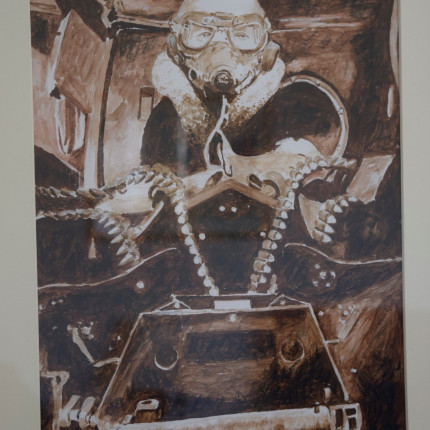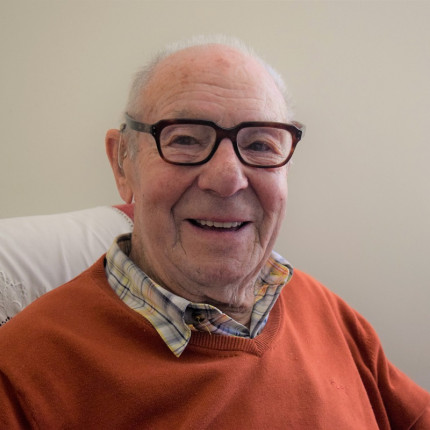To commemorate this year’s Remembrance Day, we heard from a World War Two veteran who served on a Lancaster bomber.
The air gunner, who took aim at enemy fighters from the bomber’s rear gun turret, says he didn’t expect to return from missions over Nazi Germany.
A World War Two veteran who served on a Lancaster bomber says he ‘didn’t expect to come back’ from missions over Nazi Germany.
Geoffrey Payne, 98, was enlisted into the Royal Air Force in 1943.
He served as a rear gunner on a Lancaster bomber and flew on 30 operational missions.
Most of the missions were to bomb Nazi industrial targets at night-time, and were without an RAF fighter escort.
Geoffrey said: “I didn’t expect to come back any time I went.
“The Germans knew you were coming because of radar activity. They would listen in on how much activity was going on, and they’d know there would be an air raid against them that night.”
The flights were long and Geoffrey had to stay alert.
“My first flight was eight and a half hours, to Augsberg in southern Germany,” Geoffrey said.
“We went to Poland once, too. Before D-Day, most of the air raids were industrial targets.
"After D-Day, we went on shorter trips to military targets on the Rhine River.”
As a rear gunner located behind the tail of the aeroplane, Geoffrey was responsible for spotting and firing at enemy fighter planes.
“You were stuck in your gun turret all the way, during the flight. We would sit and watch out for enemy fighters,” he said.
“Mostly they would attack from behind, but sometimes over the target, they would come in from the side. Your turret could come around 90 degrees to each side, so you could fire at them.
“Most rear gunners had the Perspex screens cut away so you could see better. Otherwise, if you got a bit of oil on the Perspex, you’d think you’d see a fighter.”
High above Europe late at night, rear gunner turret would get very cold.
Geoffrey said: “It’d get down to 40 degrees Fahrenheit (4.4 degrees Celsius). It got very cold.”
On just his fourth mission, Geoffrey’s Lancaster came under heavy fire from a Messerschmitt Bf 110 fighter plane
Geoffrey saw the Messerschmitt approaching and tried to warn the pilot. However, the radio had frozen and wasn’t operational. Geoffrey tried to fire at the Messerschmitt, but his guns had jammed.
The Messerschmitt opened fire and bullets tore through the Lancaster. Geoffrey said he remembered thinking “..so this is how I’m going to die”.
“I thought, this is it. There was nothing I could do about it. My guns were jammed, my intercom was US [unserviceable], my oxygen mask was frozen, I couldn’t fire at anybody. I knew immediately, we would get shot up.”
Geoffrey managed to get out of his turret and into the main body of the plane.
Geoffrey said: “I walked past where the mid-upper gunner was supposed to be, and the main door was open. He had disappeared… he had gone and parachuted out over Germany.
“I walked up further and found that my main crew was still okay.”
The bullet-stricken bomber limped back to base. Geoffrey’s nerves went back on edge after the bomber landed though: he smelt something burning near his ammunition.
Geoffrey said: “I thought there was something in the ammunition panniers right behind me. It turned out there was a German incendiary bullet in with all the ammunition, and it was still burning.
“If that had caught, the whole lot would’ve gone off. But the ground crew rushed in and put it out.”
After the mission, Geoffrey was hospitalised due to frostbite.
Geoffrey said: “I’ve still got that numbness in my fingers. My hands are always cold.”

When asked about Remembrance Day Geoffrey said: "The important thing is thinking about it. And appreciating the sacrifices.
"I think about all the people who never came back.”
Once he recovered from frostbite, Geoffrey transferred to Waterbeach 514 squadron based in Cambridge to fully recuperate. He then joined the 514 squadron crew and served with the 514 for his next 26 bombing missions.
Geoffrey stayed with the same flight crew.
“There were seven of us on the bombers: a pilot, a flight engineer, a navigator, a bomber, two gunners, and a wireless operator who was known as the WOP AG, as they could also be an air gunner."
Geoffrey and his flight crew remained firm friends and kept in contact over the decades.
“But, I’ve never been able to trace my first air gunner, who bailed out. I’ve never been able to contact him.”
Geoffrey continued his service after the war finished. He was trained to drive heavy goods vehicles and was posted to Germany as part of the reparations process. He remembers driving to German military factories and acquiring the technology and blueprints for German weaponry.
On return to civilian life, Geoffrey resumed his job at a sheet metal factory in Birmingham. He then used the skills he had learnt in the RAF to take on a transport role. Geoffrey had a number of driving jobs and was also briefly a coalman in his local town. He later decided it was time for a complete change and gained employment with Carron in Falkirk.
Geoffrey said: “Carron was founded in 1759 and they made cannons for battleships. Then they went on to make cast iron baths. They used to do their own smelting.
“In the 1960s, the government gave various companies money to expand their works.
“I came up and set up part of a pressed steel bath plant for Carron. I ended up as Production Director for the pressed steel bath plant. And I worked there for the next 23 years until I retired.”
Geoffrey was a keen sportsman throughout his life. While serving in Germany after the war, he played football for a British army team.
“We played against the German Frankfurt side, and various German sides. It was friendly, but it was friendly because they kept winning,” he laughed.
“There was no real animosity at that time because, I think, everybody was pleased the war had finished.”
Geoffrey was also an excellent amateur athlete and won many prizes, competing in Decathlon events around the Midlands area. In later years, his passion was rugby and he played in local leagues right up to the age of 50. He was involved in setting up youth teams in Cumbernauld and helped with coaching, fundraising and administration into his 70’s.
In his retirement, he enjoyed going on walking holidays with his wife to the North of Scotland. He also did a lot of work for the Airforce Association. These days, Geoffrey lives in Cumbernauld. He receives care from his son and his daughter-in-law and is visited by his grandchildren.
The former air gunner says he was pleased he got to make a contribution to Britain’s war effort.
Geoffrey said: “It had to be done. Germany’s ambition was world conquest. That’s what Hitler was really looking for.
“I enjoyed the service life. There was a lot of comradeship, which you didn’t find on civvy street a lot of the time.
“I’m pleased I did it. It’s a once-in-a-lifetime thing that occurs.”
This Remembrance Day, Geoffrey said he would be thinking about the sacrifice made by those who went to war.
"It’s always been important to me, Remembrance Day. I remembered it as a kid at school and it’s carried on all the way through.
“My biggest impression was when I was a child, seeing injured soldiers from the First World War. As a young lad, we’d just moved into a new estate in Birmingham. There was a Scottish soldier with one leg who would come up the road to collect food and money. There was very little help for veterans.
“Terrible things occurred in wartime. This business that’s happening today, the war in Ukraine, makes me feel sick.”
Geoffrey said: “The important thing is thinking about it. And appreciating the sacrifices.
“I think about all the people who never came back.”

You may also be interested in
Support for veterans
Help us reach a veteran who is not currently receiving our life changing support.
World War Two veteran with sight loss recalls chance encounter with neighbour in midst of 1944 Normandy battle
A World War Two veteran with sight loss has recalled the poignant moment he came face-to-face with his next door neighbour during the 1944 Invasion of Normandy.
World War Two veteran and rock climber, 95, proves he can still scale walls despite sight loss
A 95-year-old World War Two veteran with a passion for rock climbing has been scaling walls once again with the support of a sight loss charity.